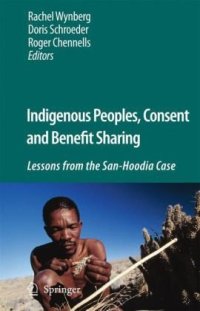
Ebook: Indigenous Peoples, Consent and Benefit Sharing: Lessons from the San-Hoodia Case
- Genre: Other Social Sciences // Philosophy
- Tags: Environmental Law/Policy/Ecojustice, Social Sciences general, Anthropology, Sociology, Ethics, Social Policy
- Year: 2009
- Publisher: Springer Netherlands
- Edition: 1
- Language: English
- pdf
Indigenous Peoples, Consent and Benefit Sharing is the first in-depth account of the Hoodia bioprospecting case and use of San traditional knowledge, placing it in the global context of indigenous peoples’ rights, consent and benefit-sharing. It is unique as the first interdisciplinary analysis of consent and benefit sharing in which philosophers apply their minds to questions of justice in the Convention on Biological Diversity (CBD), lawyers interrogate the use of intellectual property rights to protect traditional knowledge, environmental scientists analyse implications for national policies, anthropologists grapple with the commodification of knowledge and, uniquely, case experts from Asia, Australia and North America bring their collective expertise and experiences to bear on the San-Hoodia case.
While much of the focus is on bioprospecting and natural product development, Indigenous Peoples, Consent and Benefit-Sharing also draws important lessons about informed consent and benefit-sharing from the health sciences and sectors such as mining. Policymakers around the world are under significant pressure to resolve the challenges of implementing the CBD. This book’s analysis and recommendations will help them.
‘It is good to see philosophers engaging with the UN Convention on Biological Diversity, and doing so by looking in depth at a real situation in which it has been invoked.’
Peter Singer, Ira W. DeCamp Professor of Bioethics in the University Center for Human Values, Princeton University
‘This book arrives at a critical juncture in the history of genetic resource use and policymaking - not only in southern Africa, but across that continent and, indeed, around the world. ABS Regime negotiators would do well to study closely the pages of this insightful and provocative volume.’
Timothy J. Hodges, Co-Chair UN CBD Working Group on Access and Benefit Sharing of Genetic Resources (ABS)
‘A timely study of the way in which the key elements of the CBD relating to access to genetic resources - prior informed consent, benefit sharing - may, or may not, work in the real world, especially as it relates to the knowledge and innovations of indigenous peoples and local communities. Analytical, in-depth and insightful. An excellent work of scholarship.’
Gurdial Nijar, Director of the Centre of Excellence for Biodiversity Law [CEBLAW], Professor of Law, University of Malaya; Lead negotiator for Malaysia and the Like-Minded Megadiverse countries (LMMC) for The International ABS Regime
‘This is an eagerly anticipated book, extremely well researched, and uncovering in great detail many interesting issues that will be extremely valuable for the entire indigenous plant and traditional knowledge research and commercialisation fraternity – not only in southern Africa but worldwide.’
Cyril Lombard, Marketing Manager, PhytoTrade Africa
Indigenous Peoples, Consent and Benefit Sharing is the first in-depth account of the Hoodia bioprospecting case and use of San traditional knowledge, placing it in the global context of indigenous peoples’ rights, consent and benefit-sharing. It is unique as the first interdisciplinary analysis of consent and benefit sharing in which philosophers apply their minds to questions of justice in the Convention on Biological Diversity (CBD), lawyers interrogate the use of intellectual property rights to protect traditional knowledge, environmental scientists analyse implications for national policies, anthropologists grapple with the commodification of knowledge and, uniquely, case experts from Asia, Australia and North America bring their collective expertise and experiences to bear on the San-Hoodia case.